| Listing 1 - 10 of 148 | << page >> |
Sort by
|
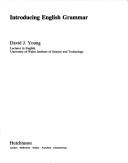
ISBN: 0091550718 9780091550714 Year: 1984 Publisher: London: Hutchinson,
Abstract | Keywords | Export | Availability | Bookmark
 Loading...
Loading...Choose an application
- Reference Manager
- EndNote
- RefWorks (Direct export to RefWorks)
English language --- Grammar --- -Germanic languages --- -Grammar --- Analysis and parsing --- Diagraming --- Composition and exercises --- Germanic languages
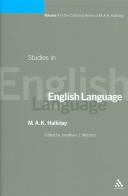
ISBN: 1474211976 1281298506 9786611298500 1847142605 9781847142603 0826458734 9780826458735 9780826483676 0826483674 9781847065742 1847065740 9781474211970 9781281298508 Year: 2005 Volume: 7 Publisher: London New York Continuum
Abstract | Keywords | Export | Availability | Bookmark
 Loading...
Loading...Choose an application
- Reference Manager
- EndNote
- RefWorks (Direct export to RefWorks)
"This is the seventh volume in the Collected Works of Professor M. A. K. Halliday: Studies in English Language. Topics covered in the papers from the section on "Theoretical foundations" include transitivity, theme-rhyme, mood, and modality in English. Other sections include papers on English intonation and grammar including discussion of word order in English and the complex structures typical of informal spontaneous conversation. The grammatical analyses of English also serve to demonstrate the application of linguistics to language teaching. "This is a fascinating volume, which is mainly devoted to Michael Halliday's thinking in the 1960s. The collection includes articles ranging from detailed innovative proposals for a description of intonation that would allow it to be incorporated into the grammar, through an ambitious re-orientation of the focus of grammatical description at a time when Systemic Grammar was emerging from Scale and Category, to a much later small-scale corpus investigation of the grammar of pain. Together they illustrate Halliday's continuing intellectual enthusiasm and openness to new linguistic trends, even though his own development has always been by accretion, rather than revolution. So, the reader is fascinated to discover how much of the early work has been retained, often in a considerably modified form, in the 21st century version of Systemic Functional Grammar." - Malcolm Coulthard, Professor of English Language and Linguistics, University of Birmingham, UK"--Bloomsbury Publishing This is the seventh volume in the Collected Works of Professor M. A. K. Halliday: Studies in English Language. Topics covered in the papers from the section on "Theoretical foundations" include transitivity, theme-rhyme, mood, and modality in English. Other sections include papers on English intonation and grammar including discussion of word order in English and the complex structures typical of informal spontaneous conversation. The grammatical analyses of English also serve to demonstrate the application of linguistics to language teaching. "This is a fascinating volume, which is mainly devoted to Michael Halliday's thinking in the 1960s. The collection includes articles ranging from detailed innovative proposals for a description of intonation that would allow it to be incorporated into the grammar, through an ambitious re-orientation of the focus of grammatical description at a time when Systemic Grammar was emerging from Scale and Category, to a much later small-scale corpus investigation of the grammar of pain. Together they illustrate Halliday's continuing intellectual enthusiasm and openness to new linguistic trends, even though his own development has always been by accretion, rather than revolution. So, the reader is fascinated to discover how much of the early work has been retained, often in a considerably modified form, in the 21st century version of Systemic Functional Grammar." - Malcolm Coulthard, Professor of English Language and Linguistics, University of Birmingham, UK
English language --- Grammar. --- Analysis and parsing --- Diagraming --- Composition and exercises --- English language. --- Germanic languages
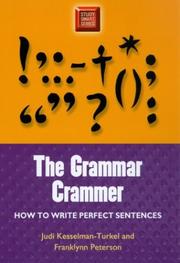
ISBN: 0299191338 9780299191337 0299191346 9780299191344 Year: 2003 Publisher: Madison, Wisconsin
Abstract | Keywords | Export | Availability | Bookmark
 Loading...
Loading...Choose an application
- Reference Manager
- EndNote
- RefWorks (Direct export to RefWorks)
Explains some of the more troublesome and confusing aspects of English grammar under the topics of nouns, pronouns, verbs, modifiers, sentences, conjunctions and prepositions, and punctuation. Includes practice quizzes.
English language --- Composition and exercises. --- Grammar. --- Rhetoric. --- Analysis and parsing --- Diagraming --- Composition and exercises --- Germanic languages
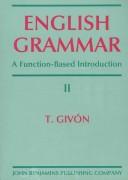
ISBN: 1280497270 9786613592507 902727388X 9789027273888 9027220999 1556194587 Year: 1993 Publisher: Amsterdam/Philadelphia John Benjamins Pub. Co.
Abstract | Keywords | Export | Availability | Bookmark
 Loading...
Loading...Choose an application
- Reference Manager
- EndNote
- RefWorks (Direct export to RefWorks)
The approach to language and grammar that motivates this book is unabashedly functional; grammar is not just a system of empty rules, it is a means to an end, an instrument for constructing concise coherent communication. In grammar as in music, good expression rides on good form. Figuratively and literally, grammar like musical form must make sense. But for the instrument to serve its purpose, it must first exist; the rules must be real, they can be explicitly described and taught. This book is intended for both students and teachers, at college level, for both native and nonnative speakers.
English language --- Grammar. --- Analysis and parsing --- Diagraming --- Composition and exercises --- Germanic languages

ISBN: 1280497289 9786613592514 9027273898 9789027273895 1556194579 1556194641 9027220980 9027221154 9789027220981 9781280497285 661359251X Year: 1993 Publisher: Amsterdam/Philadelphia John Benjamins Pub. Co.
Abstract | Keywords | Export | Availability | Bookmark
 Loading...
Loading...Choose an application
- Reference Manager
- EndNote
- RefWorks (Direct export to RefWorks)
The approach to language and grammar that motivates this book is unabashedly functional; grammar is not just a system of empty rules, it is a means to an end, an instrument for constructing concise coherent communication. In grammar as in music, good expression rides on good form. Figuratively and literally, grammar like musical form must make sense. But for the instrument to serve its purpose, it must first exist; the rules must be real, they can be explicitly described and taught. This book is intended for both students and teachers, at college level, for both native and nonnative speakers.
English language --- Grammar. --- Analysis and parsing --- Diagraming --- Composition and exercises --- Germanic languages
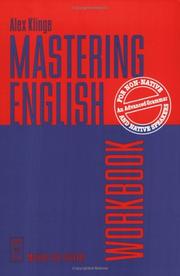
ISBN: 3110804352 9783110804355 3110158183 9783110158182 1306272548 Year: 1998 Publisher: Berlin Mouton de Gruyter
Abstract | Keywords | Export | Availability | Bookmark
 Loading...
Loading...Choose an application
- Reference Manager
- EndNote
- RefWorks (Direct export to RefWorks)
No detailed description available for "Mastering English".
English language --- Grammar --- Grammar. --- Analysis and parsing --- Diagraming --- Composition and exercises --- Germanic languages
Book
ISBN: 9780521171878 9781107001329 Year: 2013 Publisher: Cambridge Cambridge University Press
Abstract | Keywords | Export | Availability | Bookmark
 Loading...
Loading...Choose an application
- Reference Manager
- EndNote
- RefWorks (Direct export to RefWorks)
English language --- Grammar --- Syntax --- Morphology --- Analysis and parsing --- Diagraming --- Composition and exercises --- Germanic languages
Book
ISBN: 1443895466 9781443895460 9781443889513 1443889512 Year: 2016 Publisher: Newcastle upon Tyne
Abstract | Keywords | Export | Availability | Bookmark
 Loading...
Loading...Choose an application
- Reference Manager
- EndNote
- RefWorks (Direct export to RefWorks)
English language --- Grammar. --- Analysis and parsing --- Diagraming --- Composition and exercises --- Germanic languages
Book
ISBN: 3960676573 9783960676577 Year: 2017 Publisher: Hamburg Anchor Academic Publishing
Abstract | Keywords | Export | Availability | Bookmark
 Loading...
Loading...Choose an application
- Reference Manager
- EndNote
- RefWorks (Direct export to RefWorks)
English language --- Grammar. --- Analysis and parsing --- Diagraming --- Composition and exercises --- Germanic languages
Book
ISBN: 9781108470339 9781108632706 1108470335 9781108455862 1108455867 Year: 2020 Publisher: Cambridge Cambridge University Press
Abstract | Keywords | Export | Availability | Bookmark
 Loading...
Loading...Choose an application
- Reference Manager
- EndNote
- RefWorks (Direct export to RefWorks)
"1.1 Linguistic and syntactic competence We language users believe that we 'know' a language, but the question is what we know when we know a language like English or Korean. It may mean that we know how to create natural English sentences like (1a), but not unnatural sentences like (1b).1 (1) a. We can't pay for health care benefits like this, but you can. b. *We can't keep paying for health care benefits like this, but you can keep.2 In the same way, speakers who know English may accept (2a) and (2c), but not (2b):3 (2) a. Frank sneezed. b. *Frank sneezed the napkin. c. Frank sneezed the napkin off the table. This implies that knowing a language means that (English) speakers have linguistic knowledge sufficient to distinguish between 'acceptable' and 'unacceptable' sentences. However, when speakers are asked to articulate what kind of knowledge allows them to make these distinctions, it is not easy for them to describe it. This knowledge of language, often called linguistic competence, is the ability to speak a language. Knowing one's native language requires neither skill nor talent, but it is nonetheless an accomplishment worthy of investigation"--
Grammar --- English language --- Syntax --- Analysis and parsing --- Diagraming --- Composition and exercises --- Germanic languages
| Listing 1 - 10 of 148 | << page >> |
Sort by
|

 Search
Search Feedback
Feedback About UniCat
About UniCat  Help
Help News
News